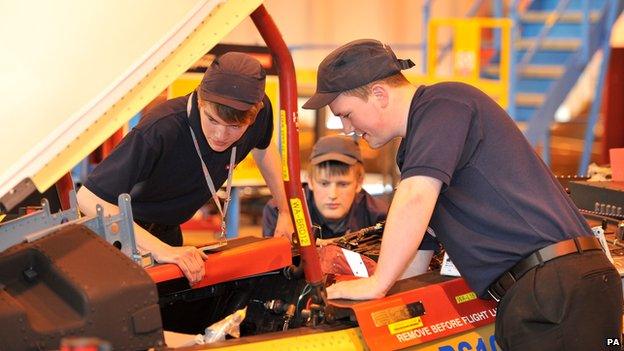Youth unemployment: Challenges and potential solutions
- Published

The commission chaired by businessman Sir Ian Wood made a number of recommendations
The Scottish government's plans to help cut youth unemployment stem from a commission on developing Scotland's young workforce which was chaired by businessman Sir Ian Wood.
Many of the commission's recommendations are built on examples of good practice up and down the country - for instance, efforts to encourage schools, colleges and employers to work more closely together.
Unemployment amongst 16 to 19-year-olds is already at its lowest level for several years.
The government has a promise of a place in education or training to everyone in that age group who does not have a job.
The number of so-called teenage Neets - youngsters who aren't in education, employment or training - has been declining.
Good jobs
Often there are very specific, and challenging, reasons to explain the situation of unemployed teenagers.
But some concerns remain.
Colleges will always point to examples of achievement: young people whose studies lead them to a good job or towards a university qualification.
However, the question is the extent to which this guarantee of a place in education may sometimes simply "park" the youth unemployment problem until people are in their early 20s.
In other words, are some young people found places on courses they don't especially want to be doing because they would otherwise be out of work?
If so, these reluctant learners might be more likely to find themselves unemployed - or at least underused - once they are out of education (the same, of course, can be equally true of a middle class youngster who has only gone to university because of parental pressure).
Vocational education
There are all kinds of challenges and potential solutions here.
One is helping ensure young people get the best possible careers guidance and vocational education. That way youngsters are more likely to be doing courses they want to do and benefit from them.
Another is to help increase the number of modern apprenticeships available - often they provide a good alternative to university or a full-time college course.
But another challenge concerns unemployment itself. Ultimately, employers need to be willing to recruit and jobs need to be available.
Reducing youth unemployment substantially may well be just as much about economic policy as education.
But the greater the young person's skills, the less likely they are to become an unemployment statistic.
- Published15 December 2014
